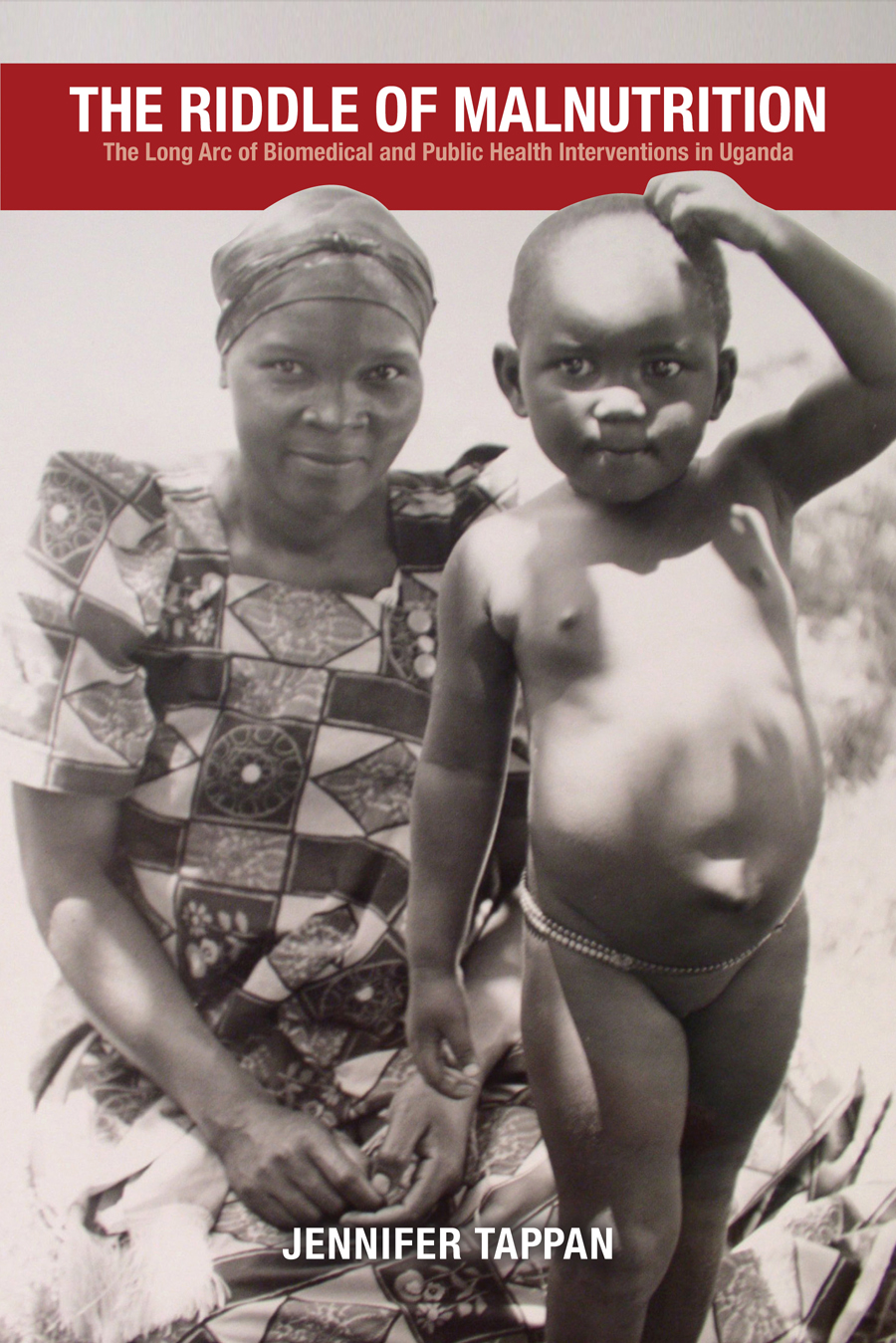Current Research
Jennifer Tappan is currently researching the history of yellow fever in Africa. Yellow fever is an incurable and highly fatal viral haemorrhagic disease and an estimated 30,000 people die of yellow fever each year. Although yellow fever epidemics once wreaked havoc across the Americas, approximately 90% of yellow fever now occurs exclusively in Africa. Tappan's research examines how, in the 20th-century, yellow fever became an "African disease" even as Africa became the focus of yellow fever research.
Globally, more than ten million children suffer from severe acute malnutrition each year. In Uganda, longstanding efforts to treat and prevent the condition medicalized it in the eyes of biomedical personnel and the Ugandan people. Malnutrition came to be seen as a disease rather than a preventable condition, further compromising nutritional health in Uganda. Physicians responded to this failure by developing a novel public health program known as Mwanamugimu. The new approach prioritized local expertise and empowerment, blending biomedical knowledge with African cultural competencies.
Over the course of half a century, Mwanamugimu tackled the most fatal form of childhood malnutrition—kwashiorkor—and promoted nutritional health in the midst of political upheaval and neoliberal resource constraints. In The Riddle of Malnutrition, Jennifer Tappan reveals the interplay between colonialism, the production of scientific knowledge, and the delivery of health services in contemporary Africa.
“Tappan’s rich study explores how complex health issues in Africa and other regions of the global south have been falsely constructed as problems that can be easily addressed through the application of externally derived biomedical technologies. A must read for public health scholars and practitioners.”—Randall M. Packard, author of A History of Global Health: Interventions into the Lives of Other Peoples
Mother feeding child at the Mwanamugimu Nutrition Rehabilitation Unit, Mulago, Uganda, c. 1965
“An incisive and sensitive portrayal of the real implications of the uneven generation of knowledge in East Africa. Tappan locates the history of nutrition not only in a succession of hypotheses tested on the bodies of Ugandan children, but in later community demonstration meals and in the willingness of researchers to recognize and reflect on the unintended consequences of their actions.”—Holly Hanson, author of Landed Obligation: The Practice of Power in Buganda
“By tracing the twists and turns in the epidemiology and treatment of severe acute malnutrition in Uganda into the present, The Riddle of Malnutrition delivers an illuminating analysis of the relationship between scientific research and efforts to provide medical care in Africa over the last century.”—Neil Kodesh, author of Beyond the Royal Gaze: Clanship and Public Healing in Buganda
The Riddle of Malnutrition was featured in the Washington Post's African Politics Summer Reading Spectacular!
Articles & Book Chapters:
“Wandering Epizootics and Zones of Emergence: Constructing Yellow Fever Endemicity in Africa.” Health & Place, April 28, 2022, 102770. https://doi.org/10.1016/j.healthplace.2022.102770.
“Blood Work and Rumors of Blood: Nutritional Research and Insurrection in Buganda, 1938-1952,” International Journal of African Historical Studies special edition on “Incorporating Medical Research into the History of Medicine in East Africa” 47:3 (2014): 473-494.
“The True Fiasco: The Treatment and Prevention of Severe Acute Malnutrition in Uganda, 1950-1974,” in Global Health in Africa: Historical Perspectives on Culture, Epidemiology, and Disease Control, Tamara Giles-Vernick and James L.A. Webb, Jr., eds. (Athens: Ohio University Press, 2013), 92-113.
Book Reviews & Encyclopedia Entries:
The History of Blood Transfusion in Sub-Saharan Africa, By William M. Schneider, Perspectives on Global Health (Athens: Ohio University Press, 2013) Book Review in The International Journal of African Historical Studies, 47:2 (2014): 347-349.
When People Come First: Critical Studies in Global Health, edited by João Biehl and Adriana Petryna, (Princeton, NJ: Princeton University Press, 2013), Book Review in Global Public Health: An International Journal for Research, Policy and Practice, 9:7 (2014): 856-857.
Poverty, Health and Reproduction in Early Colonial Uganda by Jan Kuhanen (Joensuu, Finland; University of Joensuu, 2005), Book Review in The International Journal of African Historical Studies, 32:2 (2006): 307-309.
“Trowell, Hubert Carey” in Dictionary of Medical Biography edited by W.F. and Helen Bynum (Westport, CT: Greenwood Press, 2007).
Talks & Presentations
Part of the 2011-12 University of Oregon African Studies Lecture Studies Dr. Tappan is a historian who has conducted extensive archival work in Uganda and Great Britain with an emphasis on the local reactions to policy changes and public health campaigns.




